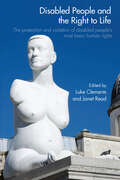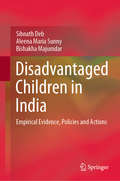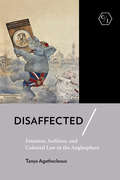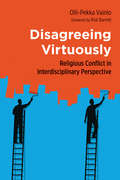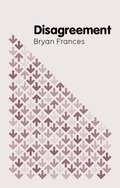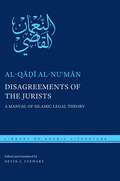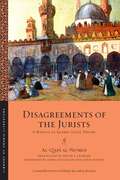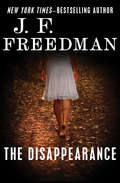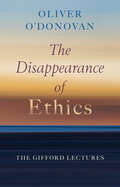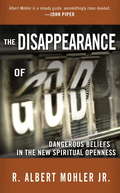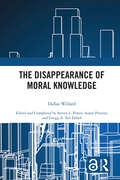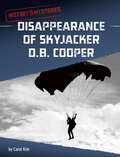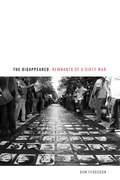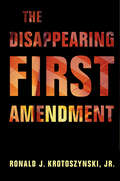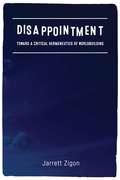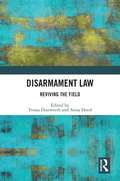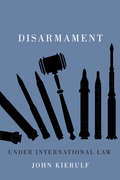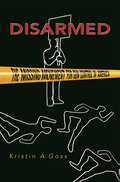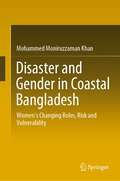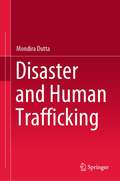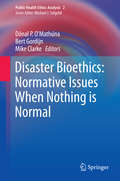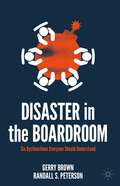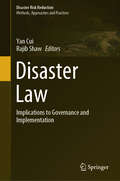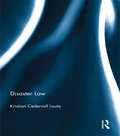- Table View
- List View
Disabled People and the Right to Life: The Protection and Violation of Disabled People’s Most Basic Human Rights
by Janet Read Luke ClementsThe most basic of human rights, the right to life, is the focus of this book. 'Human rights' has increasingly come to be seen as a significant framework, both to aid understanding of the experiences of those who face oppression, and to underpin social, legal and political measures to counter it. Disabled People and the Right to Life uses this framework to explore how disabled people’s right to life is understood in different national contexts and the ways in which they are – or are not – afforded protection under the law, emphasizing the social, cultural and historical forces and circumstances which have promoted disabled people’s right to life or legitimated its violation. Written by an international panel of contributors including individuals holding public office, academics from the fields of law, social policy, disability studies and bioethics as well as practitioners and activists attempting to further disabled people’s human rights, this truly interdisciplinary book will be of interest to students and researchers of disability, law, social policy and human rights.
Disadvantaged Children in India: Empirical Evidence, Policies and Actions
by Sibnath Deb Aleena Maria Sunny Bishakha MajumdarThis book addresses issues concerning five major categories of disadvantaged children, namely street children, children involved in trafficking, child labor, slum children, and children in institutional care, which apply to a large number of children around the world, including India. Compiling primary and secondary research-based evidences in addition to the first-hand experiences of the authors, it describes the link between social dynamics and the plight of disadvantaged children from both social and cultural perspectives. Each chapter includes examples and case studies to offer readers essential insights into the real-life situations of these children. At the end of each chapter, a number of evidence-based measures and models are proposed for agencies working to support disadvantaged children. Given its comprehensive coverage, the book is of interest to scholars, and government and non-government agencies involved in the welfare of disadvantaged children, funding agencies, and social science, medical and public health professionals.
Disaffected: Emotion, Sedition, and Colonial Law in the Anglosphere (Corpus Juris: The Humanities in Politics and Law)
by Tanya AgathocleousDisaffected examines the effects of antisedition law on the overlapping public spheres of India and Britain under empire. After 1857, the British government began censoring the press in India, culminating in 1870 with the passage of Section 124a, a law that used the term "disaffection" to target the emotional tenor of writing deemed threatening to imperial rule. As a result, Tanya Agathocleous shows, Indian journalists adopted modes of writing that appeared to mimic properly British styles of prose even as they wrote against empire. Agathocleous argues that Section 124a, which is still used to quell political dissent in present-day India, both irrevocably shaped conversations and critiques in the colonial public sphere and continues to influence anticolonialism and postcolonial relationships between the state and the public. Disaffected draws out the coercive and emotional subtexts of law, literature, and cultural relationships, demonstrating how the criminalization of political alienation and dissent has shaped literary form and the political imagination.
Disagreeing Virtuously: Religious Conflict in Interdisciplinary Perspective
by Olli-Pekka VainioDisagreement is inevitable, particularly in our current context, marked by the close coexistence of conflicting values and perspectives in politics, religion, and ethics. How can we deal with disagreement ethically and constructively in our pluralistic world? In Disagreeing Virtuously Olli-Pekka Vainio presents a valuable interdisciplinary approach to that question, drawing on insights from intellectual history, the cognitive sciences, philosophy of religion, and virtue theory. After mapping the current discussion on disagreement among various disciplines, Vainio offers fresh ways to understand the complicated nature of human disagreement and recommends ways to manage our interpersonal and intercommunal conflicts in ethically sustainable ways.
Disagreement (Key Concepts In Philosophy)
by Bryan FrancesRegardless of who you are or how you live your life, you disagree with millions of people on an enormous number of topics from politics, religion and morality to sport, culture and art. Unless you are delusional, you are aware that a great many of the people who disagree with you are just as smart and thoughtful as you are - in fact, you know that often they are smarter and more informed. But believing someone to be cleverer or more knowledgeable about a particular topic usually won’t change your mind. Should it? This book is devoted to exploring this quandary - what should we do when we encounter disagreement, particularly when we believe someone is more of an authority on a subject than we are? The question is of enormous importance, both in the public arena and in our personal lives. Disagreement over marriages, beliefs, friendships and more causes immense personal strife. People with political power disagree about how to spend enormous amounts of money, about what laws to pass, or about wars to fight. If only we were better able to resolve our disagreements, we would probably save millions of lives and prevent millions of others from living in poverty. The first full-length text-book on this philosophical topic, Disagreement provides students with the tools they need to understand the burgeoning academic literature and its (often conflicting) perspectives. Including case studies, sample questions and chapter summaries, this engaging and accessible book is the perfect starting point for students and anyone interested in thinking about the possibilities and problems of this fundamental philosophical debate.
Disagreements of the Jurists: A Manual of Islamic Legal Theory (Library of Arabic Literature #53)
by al-Qāḍī al-NuʿmānA masterful overview of Islamic law and its diversityAl-Qadi al-Nu'man was the chief legal theorist and ideologue of the North African Fatimid dynasty in the tenth century. This translation makes available in English for the first time his major work on Islamic legal theory, which presents a legal model in support of the Fatimids’ principle of legitimate rule over the Islamic community. Composed as part of a grand project to establish the theoretical bases of the official Fatimid legal school, Disagreements of the Jurists expounds a distinctly Shi'i system of hermeneutics, which refutes the methods of legal interpretation adopted by Sunni jurists. The work begins with a discussion of the historical causes of jurisprudential divergence in the first Islamic centuries, and goes on to address, point by point, the specific interpretive methods of Sunni legal theory, arguing that they are both illegitimate and ineffective. While its immediate mission is to pave the foundation of the legal Isma'ili tradition, the text also preserves several Islamic legal theoretical works no longer extant—including Ibn Dawud’s manual, al-Wusul ila ma'rifat al-usul—and thus throws light on a critical stage in the historical development of Islamic legal theory (usul al-fiqh) that would otherwise be lost to history.A bilingual Arabic-English edition.
Disagreements of the Jurists: A Manual of Islamic Legal Theory (Library of Arabic Literature #22)
by al-Qāḍī al-NuʿmānA masterful overview of Islamic law and its diversityAl-Qadi al-Nu'man was the chief legal theorist and ideologue of the North African Fatimid dynasty in the tenth century. This translation makes available for the first time in English his major work on Islamic legal theory (usul al-fiqh), which presents a legal model in support of the Fatimid claim to legitimate rule.Composed as part of a grand project to establish the theoretical bases of the official Fatimid legal school, Disagreements of the Jurists expounds a distinctly Shi'i system of hermeneutics. The work begins with a discussion of the historical causes of jurisprudential divergence in the first Islamic centuries and goes on to engage, point by point, with the specific interpretive methods of Sunni legal theory. The text thus preserves important passages from several Islamic legal theoretical works no longer extant, and in the process throws light on a critical stage in the development of Islamic legal theory that would otherwise be lost to history.An English-only edition.
The Disappearance: The Disappearance, Above The Law, And A Killing In The Valley (The Luke Garrison Series #1)
by J. F. FreedmanA former prosecutor is determined to save a man accused of murder in this &“completely engrossing&” legal thriller from the New York Times–bestselling author (Detroit Free Press). During a sleepover with her two friends, Emma goes missing. The owners of a local news network, her parents have money and power. As the police scour the city, Emma&’s father offers a $250,000 reward for his daughter&’s safe return. Eight days after the abduction, two hikers find her. Emma has been dead for days. After a year&’s fruitless search, the police make an arrest, picking up the network&’s star anchorman. As Emma&’s father brays for blood, Luke Garrison is the only person who dares to stand in his way. Once a merciless District Attorney, Luke became a defender after mistakenly sending a man to the gas chamber. Now he will let no one—not even a bereaved father—rush justice. But is he doing the right thing, or is he fighting to set a killer free?
The Disappearance of Ethics: The Gifford Lectures
by Oliver O'DonovanThe capstone lectures of esteemed ethicist Oliver O&’Donovan What is the future of ethics? Oliver O&’Donovan addresses a discipline in crisis in The Disappearance of Ethics. Based on the 2021 Gifford Lectures, this book contends that contemporary ethics has lost its object (good), frontier (time), and agent (person). O&’Donovan traces the development of these concepts from Greek philosophy through early Christianity, the Enlightenment, and into the modern era. Engaging with a range of thinkers including Aristotle, Augustine of Hippo, Max Scheler, Karl Barth, and more, O&’Donovan shows how ethics has lost its heart and how the field can regain its purpose. He completes his lectures by integrating theology and philosophy to recover ethics. Contemplating theological concepts such as creation, divine law, and justification undergirds ethics by generating &“existential wonder.&” With characteristic warmth and scholarly precision, O&’Donovan reinvigorates ethical argument with theological insight. Scholars and students of Christian ethics will find his lectures equally provocative and inspiring.
The Disappearance of God: Dangerous Beliefs in the New Spiritual Openness
by R. Albert Mohler"Great biblical truths are meant not only for our intellectual acceptance, but for our spiritual health." -Dr. Al Mohler. More faulty information about God swirls around us today than ever before. No wonder so many followers of Christ are unsure of what they really believe in the face of the new spiritual openness attempting to alter unchanging truth. For centuries the church has taught and guarded the core Christian beliefs that make up the essential foundations of the faith. But in our postmodern age, sloppy teaching and outright lies create rampant confusion, and many Christians are free-falling for "feel-good" theology. We need to know the truth to save ourselves from errors that will derail our faith. As biblical scholar, author, and president of The Southern Baptist Theological Seminary, Dr. Albert Mohler, writes, "The entire structure of Christian truth is now under attack." With wit and wisdom he tackles the most important aspects of these modern issues: Is God changing His mind about sin? Why is hell off limits for many pastors? What's good or bad about the "dangerous" emergent movement? Have Christians stopped seeing God as God? Is the social justice movement misguided? Could the role of beauty be critical to our theology? Is liberal faith any less destructive than atheism? Are churches pandering to their members to survive? In the age-old battle to preserve the foundations of faith, it's up to a new generation to confront and disarm the contemporary shams and fight for the truth. Dr. Mohler provides the scriptural answers to show you how.
The Disappearance of Moral Knowledge
by Dallas WillardBased on an unfinished manuscript by the late philosopher Dallas Willard, this book makes the case that the 20th century saw a massive shift in Western beliefs and attitudes concerning the possibility of moral knowledge, such that knowledge of the moral life and of its conduct is no longer routinely available from the social institutions long thought to be responsible for it. In this sense, moral knowledge—as a publicly available resource for living—has disappeared. Via a detailed survey of main developments in ethical theory from the late 19th through the late 20th centuries, Willard explains philosophy’s role in this shift. In pointing out the shortcomings of these developments, he shows that the shift was not the result of rational argument or discovery, but largely of arational social forces—in other words, there was no good reason for moral knowledge to have disappeared.The Disappearance of Moral Knowledge is a unique contribution to the literature on the history of ethics and social morality. Its review of historical work on moral knowledge covers a wide range of thinkers including T.H Green, G.E Moore, Charles L. Stevenson, John Rawls, and Alasdair MacIntyre. But, most importantly, it concludes with a novel proposal for how we might reclaim moral knowledge that is inspired by the phenomenological approach of Knud Logstrup and Emmanuel Levinas. Edited and eventually completed by three of Willard’s former graduate students, this book marks the culmination of Willard’s project to find a secure basis in knowledge for the moral life.
Disappearance of Skyjacker D. B. Cooper (History's Mysteries)
by Carol KimOn November 24, 1971, a man boarded a passenger plane in Portland, Oregon. Later, he would become known as D. B. Cooper. But that wasn’t his real name, and he was no ordinary passenger. He hijacked the plane, demanded $200,000, and parachuted out of the plane with the money. He was never seen again. Who was D. B. Cooper, and what happened to him? Explore the theories behind this crime and why it has become one of history’s greatest mysteries.
The Disappeared: Remnants of a Dirty War
by Sam FergusonThe Disappeared tells the extraordinary saga of Argentina&’s attempt to right the wrongs of an unspeakably dark past. Using a recent human rights trial as his lens, Sam Ferguson addresses two central questions of our age: How is mass atrocity possible, and What should be done in its wake? From 1976 to 1983 thousands of people were the victims of state terrorism during Argentina&’s so-called Dirty War. Ferguson recounts a twenty-two-month trial of the most notorious perpetrators of this atrocity, who ran a secret prison from the Naval Mechanics School in Buenos Aires. The navy executed as many as five thousand political &“subversives,&” most of whom were sedated and thrown alive out of airplanes into the South Atlantic. The victims of these secret death flights and others who went missing during the regime are known as los desaparecidos—&“the disappeared.&” Ferguson explores Argentina&’s novel response to mass atrocity: the country&’s remarkable and controversial decisions in 2003 to repeal a series of amnesty laws passed in the 1980s and to prosecute anew the perpetrators of the Dirty War a generation after the collapse of the country's last dictatorship. As of 2022 more than one thousand aging military officers have been indicted for their involvement in the Dirty War and hundreds of trials have commenced in the country&’s civilian courts. Among the many facets of the book, Ferguson takes an in-depth look at allegations that Father Jorge Mario Bergoglio, now Pope Francis, was involved in the disappearance of two Jesuit priests under his supervision in 1976. Bergoglio was called to testify in a closed-chambers session. Ferguson reviewed those secret proceedings and uses them as a springboard to explore the Argentine Catholic Church and its broader role in the Dirty War. The lingering but acute trauma of the victims who testified at the trial underscores the moral urgency of accountability. When a state strips its citizens of all their rights, the only response that approximates reparation is to restore the rule of law and punish the perpetrators. Yet the trial also revealed the limits of using criminal law to respond to mass atrocity. Justice demands a laser-like focus on evidence relevant to a crime, but atrocity begs for social understanding. Can the law ever bring full justice?
The Disappearing First Amendment
by Ronald J. Krotoszynski, Jr.The standard account of the First Amendment presupposes that the Supreme Court has consistently expanded the scope of free speech rights over time. This account holds true in some areas, but not in others. In this illuminating work, Ronald J. Krotoszynski, Jr acknowledges that the contemporary Supreme Court rigorously enforces the rules against content and viewpoint discrimination for those who possess the wherewithal to speak but when citizens need the government's assistance to speak - for example, access to public property for protest - free speech rights have declined. Instead of using open-ended balancing tests, the Roberts and Rehnquist Courts have opted for bright line, categorical rules that minimize judicial discretion. Opportunities for democratic engagement could be enhanced, however, if the federal courts returned to the Warren Court's balancing approach and vested federal judges with discretionary authority to require government to assist would-be speakers. This book should be read by anyone concerned with free speech and its place in democratic self-government.
Disappointment: Toward a Critical Hermeneutics of Worldbuilding
by Jarrett ZigonIncreasingly, anthropologists, political theorists and philosophers are calling for imaginative and creative analyses and theories that might help us think and bring about an otherwise. Disappointment responds to this call by showing how collaboration between an anthropologist and a political movement of marginalized peoples can disclose new possibilities for being and acting politically. Drawing from nearly a decade of research with the global anti-drug war movement, Jarrett Zigon puts ethnography in dialogue with both political theory and continental philosophy to rethink some of the most fundamental ontological, political and ethical concepts. The result is to show that ontological starting points have real political implications, and thus, how an alternative ontological starting point can lead to new possibilities for building worlds more ethically attuned to their inhabitants.
Disarmament Law: Reviving the Field
by Treasa DunworthThis volume seeks to start a revival of the field of disarmament law scholarship. Law is a fundamental component of disarmament, yet today, most perspectives on the wide range of disarmament issues that exist come primarily from political, diplomatic and public advocacy angles. The aim of this book is to revive the field of disarmament law building on earlier, important and still relevant contributions by international lawyers to the subject. The collection brings together international scholars on various aspects of disarmament. The contributions range across a variety of weapons types, adopt different approaches - doctrinal, historical and critical - to the issues being discussed and taken together, constitute a snapshot of the ideas, concerns and issues that currently occupy disarmament law scholars. The book will be essential reading for academics, researchers and policy-makers working in the area of disarmament.
Disarmament under International Law
by John KierulfRussia’s annexation of Crimea and involvement in the conflict in eastern Ukraine has in many respects set back post-Cold War improved relations between Russia, the United States, and Europe. The continued war in Syria threatens the security and stability of many countries in the Middle East and attacks by ISIS and other terrorist organizations are causing increased fear and instability in Iraq and in neighbouring countries. In many areas negotiations on disarmament and arms control are at a standstill. In Disarmament under International Law, John Kierulf examines and discusses how disarmament, arms control, and non-proliferation of both conventional weapons and weapons of mass destruction are regulated in existing treaties and conventions. From his perspective as a former disarmament negotiator, Kierulf explains the United Nations’ disarmament machinery and procedures, and describes the UN’s essential role in promoting disarmament. Underlining the continued and serious threat posed by nuclear weapons, Kierulf appeals for increased and effective international efforts to reduce their number and ultimately eliminate them. Presenting information and analysis on a comprehensive range of issues, Disarmament under International Law is an essential guide for anyone interested in gaining knowledge about the current state of international security.
Disarmament under International Law (Human Dimensions in Foreign Policy, Military Studies, and Security Studies #4)
by John KierulfRussia’s annexation of Crimea and involvement in the conflict in eastern Ukraine has in many respects set back post-Cold War improved relations between Russia, the United States, and Europe. The continued war in Syria threatens the security and stability of many countries in the Middle East and attacks by ISIS and other terrorist organizations are causing increased fear and instability in Iraq and in neighbouring countries. In many areas negotiations on disarmament and arms control are at a standstill. In Disarmament under International Law, John Kierulf examines and discusses how disarmament, arms control, and non-proliferation of both conventional weapons and weapons of mass destruction are regulated in existing treaties and conventions. From his perspective as a former disarmament negotiator, Kierulf explains the United Nations’ disarmament machinery and procedures, and describes the UN’s essential role in promoting disarmament. Underlining the continued and serious threat posed by nuclear weapons, Kierulf appeals for increased and effective international efforts to reduce their number and ultimately eliminate them. Presenting information and analysis on a comprehensive range of issues, Disarmament under International Law is an essential guide for anyone interested in gaining knowledge about the current state of international security.
Disarmed: The Missing Movement for Gun Control in America (Princeton Studies in American Politics: Historical, International, and Comparative Perspectives #103)
by Kristin GossMore than any other advanced industrial democracy, the United States is besieged by firearms violence. Each year, some 30,000 people die by gunfire. Over the course of its history, the nation has witnessed the murders of beloved public figures; massacres in workplaces and schools; and epidemics of gun violence that terrorize neighborhoods and claim tens of thousands of lives. Commanding majorities of Americans voice support for stricter controls on firearms. Yet they have never mounted a true national movement for gun control. Why? Disarmed unravels this paradox. Based on historical archives, interviews, and original survey evidence, Kristin Goss suggests that the gun control campaign has been stymied by a combination of factors, including the inability to secure patronage resources, the difficulties in articulating a message that would resonate with supporters, and strategic decisions made in the name of effective policy. The power of the so-called gun lobby has played an important role in hobbling the gun-control campaign, but that is not the entire story. Instead of pursuing a strategy of incremental change on the local and state levels, gun control advocates have sought national policies. Some 40% of state gun control laws predate the 1970s, and the gun lobby has systematically weakened even these longstanding restrictions. A compelling and engagingly written look at one of America's most divisive political issues, Disarmed illuminates the organizational, historical, and policy-related factors that constrain mass mobilization, and brings into sharp relief the agonizing dilemmas faced by advocates of gun control and other issues in the United States.
Disaster and Gender in Coastal Bangladesh: Women’s Changing Roles, Risk and Vulnerability
by Mohammed Moniruzzaman KhanThis volume explores the discourse of disaster and women in the existing social settings and state disaster-related affairs in coastal Bangladesh. It covers various issues ranging from disproportionate vulnerability, coping and adaptation mechanisms for women, limitations for promoting participation and involvement of women in the decision-making process both in family and community and changes in the role and responsibilities of women for reducing disaster risk and vulnerability. It contributes to the deconstruction of gender-based identity by addressing women's changing practices and roles in the coastal area in terms of the involvement of women with the development process, earning/income generation activities, decision-making process, access and entitlements to resources. This book presents the most current and inclusive circumstances of disaster and women of the coastal area in Bangladesh. The insights obtained through the eyes of a sociologist from a holistic perspective make this book different and unique. The book is of interest to researchers, academics, policymakers and professionals engaged in the social understanding of disaster studies, as well as to researchers and practitioners in interdisciplinary domains, including sociology, gender studies, social work, environmental studies, and development studies.
Disaster and Human Trafficking
by Mondira DuttaThe book highlights the root cause of human trafficking and analyses how factors of vulnerability affect the marginalized, especially during and after a disaster. Human trafficking like other studies on disaster research, needs to be tackled from various perspectives such as empowering the vulnerable people, creating awareness, strengthening the disaster risk reduction measures and creating a common platform to fight the vicious circle by breaking its continuity and making strategies victim centric and people friendly.The book adapts a multidisciplinary approach embedding concepts from political, social, economic and anthropological perceptions. The discourse in the book revolves around the emotional and psycho-social stress factors including weak implementation of laws and policies at various levels. The content weaves around three themes -- magnitude and interlinks between disaster and human trafficking; policies and protocols on disaster risk reduction and human trafficking and community participation and institutional support. Through these themes, the volume works on identification of the vulnerable areas which are not in compliance with the Sendai Framework of Action, 2015 in the backdrop of the Disaster Management Act of India, 2005. The volume will be of immense interest to a wide range of practitioners, researchers, academicians, policy makers, political leaders, gender experts, international organizations, disaster management authorities, civil society organisations, and scholars working in the area of human rights in general and trafficking in particular. Note: This research was funded by Indian Council of Social Science Research (ICSSR).Human Trafficking is complex, layered and lies at the intersections of multiple vulnerabilities, gender being among the most significant ones. This gets exacerbated during both natural and human made disasters. Any attempt to either understand or address it will be fraught with challenges if women and girls' unique vulnerabilities, as well as their needs, voice, choice, agency and safety is not centre-staged in any effort. Mondira's book does exactly that...it succinctly and in simple words explores the compounding discriminations, including structural inequalities, that cause and result in women and girls differential gendered vulnerabilities to being trafficked during disasters. Once this is understood, the solutions can be specific, gender responsive, and sustainable.- Anju Dubey Pandey, Gender Responsive Governance and Ending Violence against Women Specialist, UN Women, New Delhi, India
Disaster Bioethics: Normative Issues When Nothing is Normal
by Dónal P. O'Mathúna Bert Gordijn Mike ClarkeThis book provides an early exploration of the new field of disaster bioethics: examining the ethical issues raised by disasters. Healthcare ethics issues are addressed in the first part of this book. Large-scale casualties lead to decisions about who to treat and who to leave behind, cultural challenges, and communication ethics. The second part focuses on disaster research ethics. With the growing awareness of the need for evidence to guide disaster preparedness and response, more research is being conducted in disasters. Any research involving humans raises ethical questions and requires appropriate regulation and oversight. The authors explore how disaster research can take account of survivors? vulnerability, informed consent, the sudden onset of disasters, and other ethical issues. Both parts examine ethical challenges where seeking to do good, harm can be done. Faced with overwhelming needs and scarce resources, no good solution may be apparent. But choosing the less wrong option can have a high price. In addition, what might seem right at home may not be seen to be right elsewhere. This book provides in-depth and practical reflection on these and other challenging ethical questions arising during disasters. Scholars and practitioners who gathered at the Brocher Foundation in Geneva, Switzerland in 2011 offer their reflections to promote further dialogue so that those devastated by disasters are respected by being treated in the most ethically soun d ways possible.
Disaster in the Boardroom: Six Dysfunctions Everyone Should Understand
by Gerry Brown Randall S. PetersonWhy when companies come crashing down, do we hear of boards who have failed in their fiduciary duties? Or that they have been ignorant, complacent or downright complicit in these scandals and downfalls? Of course, corporate scandals are nothing new, nor are they limited to any one geography. They are a damning indictment of our systems of corporate governance around the world. And yet, despite this frequency, little or nothing changes. We shrug and move on, accepting they are an unavoidable part of the system that produces incredible wealth for economies and societies. But it should not be that way. Disaster in the Boardroom shows how boards can be better. Looking at why these scandals happen, authors Peterson and Brown present in-depth case studies of major global corporations – including recent contemporary scandals associated with companies such as BP, Facebook and Uber – using the optic of their unique, original and compelling ‘six dysfunctions of the board’ analysis to reveal their particularities but also how they can be overcome. In this book, Brown and Peterson explore common attributes of scandals such as lack of independence from management, missing key voices, cultural amplification, diffusion of responsibility, rule-bound cultures and groupthink. They also identify ways to strengthen boards, improve their culture and competence, and give directors and others the power to take action and ultimately prevent disasters from happening. Disaster in the Boardroom is essential reading for every executive in every boardroom, those aspiring to board positions as well as anyone interested in why boards fail. It has never been more important to pre-identify and eradicate these boardroom dysfunctions – not least so that their impacts upon society can better seen, understood, mitigated, and avoided.
Disaster Law: Implications to Governance and Implementation (Disaster Risk Reduction)
by Yan Cui Rajib ShawThis book covers the broad aspects of disaster legislation, governance, and their implementation. The book also includes in-depth reviews and new data, based on case studies across the globe, involving multidisciplinary research. In addition, the book suggests specific policies and action measures to enhance the implementation of disaster legislation for the resilience of people and local governments. Disaster law is the core to disaster risk management. The legal framework not only provides the government an instrument to take actions before, during, and after a disaster, but it also helps in recovery process. The legislative measures provide certain levels of guidance to different stakeholders such as national governments, local governments, civil societies, and more importantly citizens. The legal provision gives people and communities certain obligations as well as responsibilities to act during or before disasters. Over the last several years, there has been new disaster laws formulated in many countries, and revisions have been made to adjust the existing disaster laws to be more effective. Although it is important to have governance provision of disaster law, its implementation is essential.
Disaster Law
by Kristian Cedervall LautaDisasters and their management are today central to public and political agendas. Rather than being understood as exclusively acts of God and Nature, natural disasters are increasingly analysed as social vulnerability exposed by natural hazards. A disaster following an earthquake is no longer seen as caused exclusively by tremors, but by poor building standards, ineffective response systems, or miscommunications. This book argues that the shift in how a disaster is spoken of and managed affects fundamental notions of duty, responsibility and justice. The book considers the role of law in disasters and in particular the regulation of disaster response and the allocation of responsibility in the aftermath of disasters. It argues that traditionally law has approached emergencies, including natural disasters, from a dichotomy of normalcy and emergency. In the state of emergency, norms were replaced by exceptions; democracy by dictatorship; and rights by necessity. However, as the disaster becomes socialized the idea of a clear distinction between normalcy and emergency crumbles. Looking at international and domestic legislation from a range of jurisdictions the book shows how natural disasters are increasingly normalized and increasingly objects of legal regulation and interpretation. The book will be of great use and interest to scholars and researchers of legal theory, and natural hazards and disasters.
